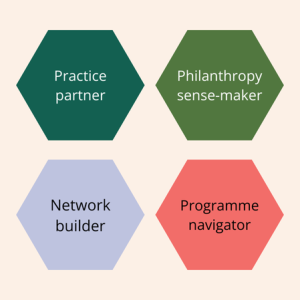In the evolving world of philanthropy, the way we learn about our progress and impact is changing quickly. Traditional monitoring, evaluation and learning (MEL) frameworks, once the backbone of accountability and impact assessment, are being supplemented, and in some cases completely reimagined, as philanthropies cope with quickly changing contexts and continue to lean into shifting systems and address root causes of inequality and injustice. To meet the needs of the moment, enter learning partnerships: dynamic, purpose-driven collaborations which prioritise strategic learning, collaboration, adaptation, and continuous improvement to enable decision-making in challenging times.
A fundamental shift
Learning partnerships represent a fundamental shift in how we think about learning. They signal a move beyond compliance and reporting, toward reflection, co-creation, and applying lessons learned quickly. This shift is especially critical for philanthropies working in complex, fluid environments where rigid frameworks often fall short.
This shift has been underway for a few years, but has picked up steam recently. Why now? Philanthropies are finding that the challenges we face – climate, inequality, systemic injustice, just to name a few – demand adaptive, relational, and values-aligned approaches. Learning partnerships are a significant step toward addressing these challenges while maintaining a commitment to a programme’s ultimate purpose and impact.
What makes them valuable
Learning partnerships bring structure and flexibility for many types of programmes, but philanthropies have found them especially valuable for portfolio-level learning. This was evidenced in recent research conducted by Itad and commissioned by Porticus on ‘when, why and how learning partnerships add value’. Through this research with a wide cross-section of learning partnership participants, we found that these partnerships help synthesise insights across diverse contexts, strengthen adaptive capacity, and build shared understanding. Crucially, they also support decision-making in real time, which is especially important when grantees are encountering hurdles in implementation, or when context shifts mean that plans must change, or a philanthropy’s expectations about what is possible in the current moment shift.
What helps them work well
Our research showed that learning partnerships are dynamic collaborations with several variables. The technical ‘ingredients’ need to be in place, but they’re not plug-and-play. Success depends on strategic enablers: trust, shared purpose, empowered focal points, and the right mix of technical and relational skills.
Choosing the most helpful Partnership Archetype

As we explored learning partnerships with grantees, learning partnership implementors, and with philanthropy staff, we found that while the encompassing title of ‘learning partnerships’ is useful, it includes a wide range of models with different purposes and approaches. Four archetypes emerged in the research:
- Practice Partner – Delivers practical, flexible learning to support adaptive strategy
- Philanthropy Sense-maker – Synthesises learning to guide philanthropy strategy and direction
- Network Builder – Connects diverse actors to reflect and learn across systems
- Programme Navigator – Bridges partner learning and philanthropy big-picture learning across a programme
Choosing the right model starts with asking the right questions: What kind of learning do we need? Who is it for? How will it shape our decisions? The models are a helpful starting point to help frame the fundamentals of a learning partnership, recognising that some organisations might select a few aspects of the archetypes to fit their unique needs.
Upcoming webinar
This is a pivotal moment for the sector, and we believe that learning partnerships will increasingly become a tool for philanthropies to meet urgent needs.
To help stimulate the conversation, we will present our research findings in an upcoming online MEL Sandbox session on learning partnerships, hosted by the UNDP Systems Monitoring, Learning & Evaluation initiative. Guests include: Marieke Hounjet (Porticus), Sarah Hanck (The Rockefeller Foundation) and Carly Olenick (Conrad N. Hilton Foundation) who will share their perspectives on governance, resourcing and setting clear boundaries in learning partnerships. Please join us!

